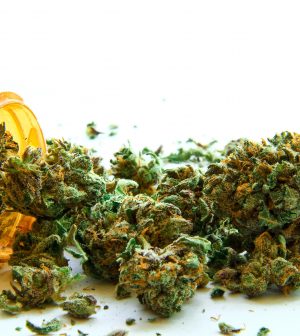- Could Your Grocery Store Meat Be Causing Recurring UTIs?
- Are You Making This Expensive Thermostat Error This Winter?
- Recognizing the Signs of Hypothyroidism
- 10 Strategies to Overcome Insomnia
- Could Artificial Sweeteners Be Aging the Brain Faster?
- Techniques for Soothing Your Nervous System
- Does the Water in Your House Smell Funny? Here’s Why
- Can a Daily Dose of Apple Cider Vinegar Actually Aid Weight Loss?
- 6 Health Beverages That Can Actually Spike Your Blood Sugar
- Treatment Options for Social Anxiety Disorder
Marijuana Should Be Moved to Lower-Risk Drug Category, U.S. Health Officials Say

THURSDAY, Aug. 31, 2023 (HealthDay News) – The U.S. Department of Health and Human Services has asked the U.S. Drug Enforcement Agency to reclassify marijuana as a less dangerous drug under the Controlled Substances Act, a move that could potentially expand acceptance of the drug.
The DEA confirmed receiving an Aug. 29 letter requesting the change and will begin its own review, a spokesperson told Bloomberg News.
The move wouldn’t legalize marijuana, but could move it from its Schedule I classification to a Schedule III. Schedule I drugs, which carry a high risk of abuse, include LSD, ecstasy and heroin. Meanwhile, Schedule III drugs can be obtained with a prescription.
Last October, President Joe Biden announced initiatives to ease marijuana penalties. He pardoned all prior simple possession offenses charged federally, asking states to do the same. At that time, Biden also asked the HHS and U.S. Attorney General to review marijuana scheduling, its medical use, potential for abuse and dependence and safety.
Cannabis advocates have said that rescheduling the drug would be acknowledging marijuana’s legitimate uses, Bloomberg News reported.
About 18% of Americans used cannabis at least once in 2019, according to data from the U.S. Centers for Disease Control and Prevention.
“Cannabis should never have been scheduled alongside heroin and placed at the center of our nation’s destructive drug war,” Edward Conklin, executive director of the U.S. Cannabis Council, told Bloomberg News. “Thankfully, that era is coming to a close and is being replaced by a modern and scientific approach to regulating this plant.”
The HHS recommendation comes after a U.S. Food and Drug Administration review that considered eight factors when determining whether a reclassification was warranted, Assistant Secretary for Health Rachel Levine told Bloomberg News.
Levine added that the National Institute on Drug Abuse agreed with the FDA recommendation.
“It’s a huge day for the cannabis industry,” Bryan Barash, co-chair of the Coalition for Cannabis Scheduling Reform, an advocacy group, and deputy general counsel for Dutchie, a platform for cannabis commerce, told Bloomberg News. “We would just hope that the federal government follows through on their recommendation.”
Still, National Cannabis Industry Association CEO Aaron Smith told Bloomberg News that this does “nothing to align federal law” with the states.
“The only way to fully resolve the myriad of issues stemming from the federal conflict with state law is to remove cannabis from the Controlled Substances Act and regulate the product in a manner similar to alcohol,” he said.
More information
The National Conference of State Legislatures has more on state and federal cannabis laws.
SOURCE: Bloomberg News
Source: HealthDay
Copyright © 2026 HealthDay. All rights reserved.










